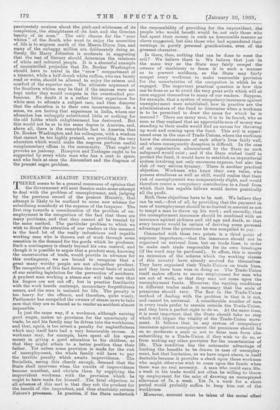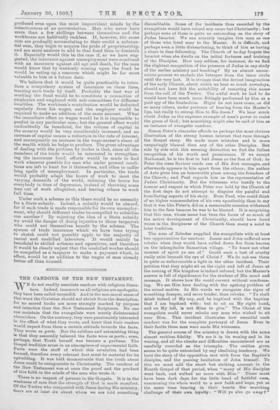, INSITRANOE AGAINST UNEMPLOYMENT.
THERE seems to be a general consensus of opinion that the Government will next Session make some attempt to deal with the problem of unemployment, and, judging by the previous record of the present Ministry, that attempt is likely to be confined to some new scheme for subsidising somebody at the expense of the taxpayer. The first step towards a consideration of the problem of un- employment is the recognition of the fact that there are many problems, and that they cannot all be treated by the same method. The particular problem to which we wish to direct the attention of our readers at this moment is the hard lot of the really industrious and capable working man who is thrown out of work through some cessation in the demand for the goods which he produces. Stich a contingency is clearly beyond his own control, and though it is possible to argue that a prudent man, knowing the uncertainties of trade, would provide in advance for this contingency, we are bound to recognise that a great many worthy people are not altogether prudent. The recognition of this fact forms the moral basis of much of our existing legislation for the prevention of accidents. A prudent man working a steam-saw will take care that his fingers are not cut off ; but in practice familiarity with the work breeds contempt, momentary forgetfulness occurs, and the man is maimed for life. The penalty is too heavy for the offence, and therefore, quite wisely, Parliament has compelled the owners of steam-saws to take care that they are so fenced as to render an accident almost impossible. In just the same way, if a workman, although earning good wages, makes no provision for the uncertainty of trade, he and his family may be driven into the workhouse,' and that, again, is too severe a penalty for neglectfulness which may itself have bad a very honourable excuse. A workman may, for example, have spent all his spare money in giving a good education to his children, so that they might attain to a better position than their father. Yet unless some provision is made for the risk of unemployment, the whole family will have to pay the terrible penalty which awaits improvidence. The Socialists, seeing this clearly enough, demand that the State shall intervene when the results of improvidence become manifest, and obviate them by supplying the improvident workman with the provision which he ought to.have made for himself. The fatal objection to all schemes of this sort is that they rob the prudent for the benefit of the imprudent, and thus absolutely reverse Nature's processes. In practice, if the State undertook the responsibility of providing for the improvident, the. people who would benefit would be, not only those who had spent their money in such an honourable manner as above suggested, but also those who had squandered their earnings in purely personal gratifications, even of the grossest character.
Is there, then, nothing that can be done to meet the evil ? We believe there is. We believe that just in the same way as the State may fairly compel the owners of machinery to fence it in such a. manner as to prevent accidents, so the State may fairly compel every workmen to make reasonable provision for the uncertainties of the occupation in which he is engaged. The important practical question is how this can be done so as to avoid the very great evils which will at once suggest themselves to many of our readers. Suppose, for example, that a system of compulsory insurance against unemployment were established, how in practice are the administrators of the fund to determine when a workman is to be permitted to draw the sums for which he is insured ? There are many men, it is to be feared, who as soon as they realised that an appreciable sum of money was standing to their credit would find an excuse for throwing up work and coming upon the fund. This evil is experi- enced even in the case of Trade-Unions, where the workmen know the circumstances of each other's lives fairly well, and where consequently deception is difficult. In the case of an organisation administered by the State no such safeguard would exist ; and. if the State wished itself to protect the fund, it would have to establish an inquisitorial system involving not only enormous expense, but also the risk of very serious tyranny. There is another practical objection. Workmen who know their own value, who possess steadiness as well as skill, would realise that their risk of unemployment was comparatively slight, and would therefore resent a compulsory contribution to a fund from which their less capable fellows would derive prabtically all the profit. • Both these objections have to be met. We believe they can be met,—first of all, by providing that the payment in case of unemployment should be so limited in amount as not to tempt a man to throw up his work ; and secondly, that the unemployment insurance should be combined with an insurance against sickness and old age and death, so that every insurer would be certain of deriving some personal advantage from the premiums he was compelled to pay.
Connected with these two points is a third .point of supreme importance,—that the insurance should not be organised on national lines, but on trade lines, in order to make each trade responsible for its own breakages (if the word may be pardoned). In effect, this is merely an extension of the scheme which the working classes of this country have already evolved for themselves: They have organised their Trade-Unions on trade lines, and they have been wise in doing so. The Trade-Union itself makes efforts to secure employment for men who are out of work, so that they may not come upon the unemployment funds. Moreover, the varying conditions in .different trades make it necessary that the scale of premiums should vary. The flaw in the Trade-Union method of dealing with the problem is that it is not, and cannot be, universal. A considerable number of men in every trade prefer to remain outside the Trade-Union, and. they have a perfect right to do so. At the same time, it is most important that the State should take no step which will impair the vitality of the Trade-Union move- ment. It follows that in any system of compulsory insurance against unemployment the premiums should be on so moderate a scale as not to deter men from also subscribing to a Trade-Union if they wish to do so, or from making any other provision for the uncertainties of life. This condition has the automatic advantage of limiting the benefits to be drawn in case of unemploy- ment, but that limitation, as we have urged above, is itself desirable because it provides a check upon those workmen who might otherwise wish to come upon the funds when there was no real necessity. A man who could earn 308. a week in his trade would not often be willing to throw up employment for the sake of drawing an unemployed allowance of . 7s. a week. Yet 7s. a week for a short. period would probably suffice to keep him out of the workhouse.
Moreover, amount must be taken of the moral effect produced even upon the most improvident minds by the eonsciousness of an accumulation. Men who never have more than a few shillings between themselves and the workhouse are habitually reckless. If, however, the same men see gradually accumulating to their credit a substan- tial sum, they begin to acquire the pride of proprietorship, and are more anxious to add to that fund than to diminish it. Especially would this be the case if, as we have sug- gested, the insurance against unemployment were combined with an insurance against.old age and death, for the man would know that by wantonly coming upon the fund he would be eating up a resource which might be far more valuable to him at a future date.
We believe that it would be quite practicable to intro- duce a compulsory system of insurance on these lines, treating each trade by itself. Probably the best way of working the fund would be to constitute a committee of employers and employed with sub-committees for different localities: The workman's contribution would be deducted regularly from his wages, and the employer would be required to make an addition of the same amount. What the immediate effect on wages would be it is impossible to predict in any particular case ; but the general effect would undoubtedly be beneficial, for the volume of capital in the country would be very considerably increased, and an increase of capital means a reduction in the rate of interest, and consequently an increase in the wage-earner's share of the wealth which he helps to produce. The great advantage of dealing with the problem by trades is that, since all the members of the trade would be interested in strengthen- ing the insurance fund, efforts would be made to find work wherever possible for men who under present condi- tions are left to hunt for it themselves, and often to suffer long spells of unemployment. In particular, the trade would probably adapt the hours of work to meet the varying demands of the world, reducing the hours for everybody in time of depression, instead of throwing some men out of work altogether, and leaving others to work full time.
Under such a scheme as this there would be no necessity for a State subsidy. Indeed, a subsidy would be absurd, for if eaeh trade is made responsible for its own unemploy- ment, why should different trades be compelled to subsidise one another ? By rejecting the idea of a State subsidy we avoid the danger of doing iujustice to those taxpayers who could not themselves benefit by the scheme. The system of trade insurance which we have been trying to sketch could not possibly apply to the majority of casual and unskilled labourers. It would mainly be beneficial to skilled artisans and operatives, and therefore it would be clearly unjust that the unskilled worker should be compelled as a taxpayer to make a payment which, in effect, would be an addition to the wages of men already better off than himself.

























































 Previous page
Previous page